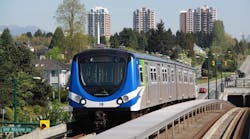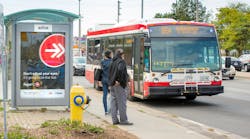National Research Council of Canada helping Canadian government organizations shift to net-zero transport systems
To support Canada's effort in reducing greenhouse gas emissions from the transportation sector, the National Research Council of Canada (NRC) is using low-carbon technologies to help industry and other government organizations shift to net-zero transport systems.
Toronto, which is Canada's most populated city, has set out to find a sustainable solution to pursue the electrification of its bus fleet, which is being supported by the NRC's Automotive and Surface Transportation Research Centre's Clean and Energy-efficient Transportation program, in partnership with the Toronto Transit Commission (TTC), Transport Canada (TC) and Environment and Climate Change Canada (ECCC). The electrification of TTC’s bus fleet is a multi-phase research project that aligns with the government of Canada's Emissions Reduction Plan, looking at the implementation of battery-powered buses, their advantages, challenges in cold weather and at developing technical references to help industry and other Canadian transit agencies adopt the technology.
Testing the TTC
The TTC is conducting one of the largest battery-electric bus trials in North America, evaluating 60 battery-electric buses from three manufacturers. Each TTC bus is outfitted with a telematics system, for which the NRC helped define analysis parameters to collect data on how far the buses travel during their service and how the battery is able to perform.
The NRC first evaluated the data from a year of operation on TTC's network, from 2020 to 2021. A second year of data, collected in 2022, was also examined and compared with the first year.
In addition to in-service testing on the Toronto transit bus network, the TTC executed three tests to better compare different types of buses by operating each of them on selected routes in different seasons to simulate service.
The NRC research team analyzed the data, looking at the speed, power demands of different systems, road grade, ambient temperature and many other factors affecting bus performance. The NRC research team also conducted a data analysis from the physical testing of the vehicles done by the TTC and ECCC. With the results, the NRC research team was able to consult its partners with the aim of advancing knowledge on the technical requirements of battery-electric buses operating in a Canadian transit environment.
One of the NRC's key roles within the multi-year research project was to support the evaluation of TTC's battery-electric buses through the analysis of the mega data, including determining how to analyze the data collected from the research. In the end, this project will provide insight to municipalities in Canada of how the buses will perform in real world operating conditions.
Supporting evidence-based decision making
The data has revealed one key factor limiting the distance battery-electric buses can travel is how cold it is outside, largely due to on-board heating demands, which can be mitigated by using small diesel heaters in the winter.
"The NRC's support has been very helpful as we continue to transition our fleet to new low and zero-emission technologies," said Mike Macas, chief vehicle engineer, bus and automotive, TTC. "The NRC has been a reliable partner in this project and has unique expertise and facilities. We are pleased to be working with them to make Toronto's transportation system more sustainable."
The NRC team is providing data to help support critical operational decisions made by the TTC and other municipalities. The information the NRC shares will also help increase confidence for ridership and ensure safety for drivers and passengers alike.
Developing guidelines
Electrifying fleet buses will result in a 95 percent fuel savings compared to current TTC buses. The data from the trial can help create a standard for real-world settings. While every city has its own unique climate and geographical factors, Toronto's climate and operational scenarios can provide a good benchmark for many municipalities across Canada for how well electric buses will perform. The work done by the NRC is intended to help municipalities in their efforts to transition to an electric system without impacting service.
The project is set to expand, incorporating innovative machine learning tools for a better analysis of the data.
"The ultimate goal of our research is to leverage the data and experience from the TTC trial to develop technical guidelines and references to help transit agencies in Canada who are interested in electrifying their fleet to better understand the real-world implications of integrating, operating and maintaining electric buses,” said Merrina Zhang, lead researcher, NRC.







